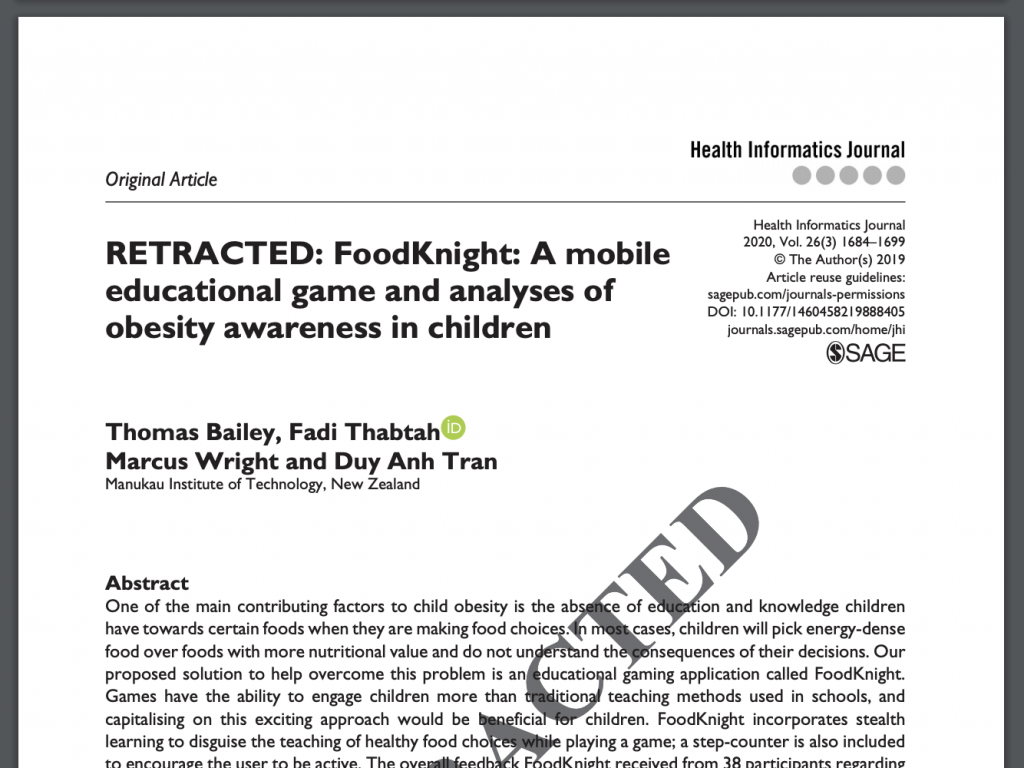
An author tells us he is taking legal action against a journal and its publisher after the editor retracted one of his papers and flagged two others.
The Health Informatics Journal has issued expressions of concern for two articles on autism and retracted one on obesity in children. According to the journal, the papers — led by Fadi Thabtah, of the Manukau Institute of Technology in Auckland, New Zealand — were marred by compromised peer review.
But that’s not all. Apparently, well, things change.
Here’s what the EoCs have to say:
The Journal Editor and SAGE Publishing hereby issue an expression of concern for the following articles.
1. Thabtah F. An accessible and efficient autism screening method for behavioural data and predictive analyses. Health Informatics J 2018; 25(4): 1739–1755. DOI: 10.1177/1460458218796636.
2. Thabtah F and Peebles D. A new machine learning model based on induction of rules for autism detection. Health Informatics J 2019; 26(1): 264–286. DOI: 10.1177/1460458218824711.
The Health Informatics Journal Editorial Office became aware that the peer review process for these articles did not meet the journal’s usual rigorous peer review standards. Following guidance from the Committee on Publication Ethics (COPE), the irregularities were investigated but it was determined that the research in these articles has moved on too far to be re-reviewed fairly. The institution of the corresponding author of this article has been informed of the irregularities and the editorial decision to publish an expression of concern for these articles.
The first paper has been cited 11 times, including eight cites by Thabtah, according to Clarivate Analytics’ Web of Science. The second has been cited nine times, five of which were by Thabtah. (Kind of like a kiss from your sister, to torture the metaphor.)
We should pause here to note that a lot can happen in two years in a given field, we’re reasonably sure that autism research hasn’t experienced such a massive tectonic shift that papers from 2018 and 2019 would be completely obviated. Unless, of course, they were wrong to begin with — which raises the question: Why not retract instead of keeping them in a kind of zombified friend zone?
The journal also has retracted a third paper by Thabtah, titled “FoodKnight: A mobile educational game and analyses of obesity awareness in children.” According to the notice:
At the request of the Journal Editor and SAGE Publishing, the following article has been retracted.
Bailey Thomas, Thabtah Fadi, Wright Marcus, Tran Duy Anh (2019) FoodKnight: A mobile educational game and analyses of obesity awareness in children. Health Informatics Journal. Epub ahead of print 23 December 2019. DOI: 10.1177/1460458219888405.
The Health Informatics Journal Editorial Office became aware that the peer review process for this article did not meet the journal’s usual rigorous peer review standards. Following guidance from the Committee on Publication Ethics (COPE), the irregularities were investigated and the article was re-reviewed by a new set of referees whose feedback informed the Editor’s decision to retract the article because the article does not satisfactorily meet the required standards of the journal.
Panos Bamidis, the editor in chief of the journal, added:
We investigated the quality of past papers in the journal after another article by a different author was flagged by a reader for alleged plagiarism https://journals.sagepub.com/doi/full/10.1177/1460458220943995.
This investigation raised concerns over the quality of the peer review for this paper and so it was sent for review post-publication. The result of this re-review led to the decision to retract the publication. The journal will not be using these peer reviewers in future.
Thabtah told us:
I do not agree with the [moves] and a legal process against the publisher and the journal’s editor has already been initiated and both parties have been contacted in regards to this.
Like Retraction Watch? You can make a tax-deductible contribution to support our work, follow us on Twitter, like us on Facebook, add us to your RSS reader, or subscribe to our daily digest. If you find a retraction that’s not in our database, you can let us know here. For comments or feedback, email us at [email protected].
Why is it so hard to get to see the article in question rather than simply the retraction notice? After finding many apparent links to the abstract and the pdf, all I can find is the title and retraction notice.
https://doi.org/10.1177%2F1460458219888405
https://www.researchgate.net/publication/337724042_FoodKnight_A_mobile_educational_game_and_analyses_of_obesity_awareness_in_children/fulltext/5de7094a92851c83645fcc94/FoodKnight-A-mobile-educational-game-and-analyses-of-obesity-awareness-in-children.pdf?origin=publication_detail
Unless there’s more to this story, the authors would seem to have a legitimate gripe. Superficial peer review is a frequent problem, but for an editor to click off on it, and then after it’s published obtain more thorough review and retract seems unfair to the authors. This one should be on the editor. Unless there’s more and the journal just put out an opaque or misleading notice.
The notice from the journal is odd. It sounds a bit like this was a case of fake reviewers or something similar, which would be a very serious accusation, but on the other hand they seem to be saying that the original review just wasn’t thorough enough.
Unless there was something nefarious (e.g. fake reviewers) I agree. I also don’t think this is the case since the journal said they would not be using those reviewers again, so I hope they would have confirmed their authenticity, and the lawsuit would bring that to light and bode poorly for the author. But how does it happen on three papers? Maybe they used reviewers recommended by the author each time and they were simply too biased to perform an adequate review? Very odd.
This is very strange. The journals have no right to do this if the papers meet minimum standards. Surface reviewed are rampant across all journals.